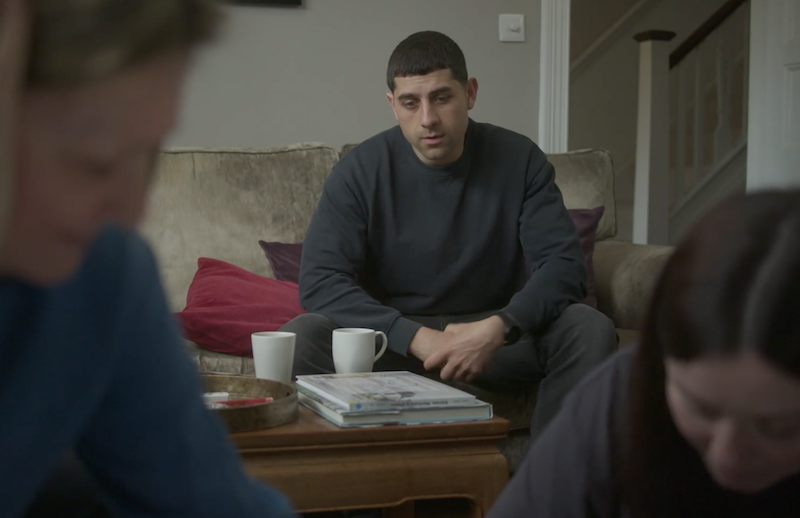17th November 2025
In recognition of International Men’s Day on 19 November 2025, we are delighted to share this Voices blog from Dr Sharin Baldwin, Senior Health Visitor Research Lead, iHV.
International Men’s Day offers an opportunity to celebrate the positive value that men bring to their families and communities, while also highlighting challenges that often remain unspoken. For health visitors, it’s a reminder that men’s mental health is family health. When fathers are supported and mentally well, the benefits extend to mothers, partners, babies, children, and the wider community. Yet, too many fathers continue to navigate their transition to parenthood feeling unseen.1 As health visitors, we have a vital opportunity to change that by noticing, listening, and ensuring fathers are visible in conversations about perinatal mental health.
We now have a strong body of evidence showing that paternal mental health is not a “nice to have” — it is essential for family wellbeing. Around one in ten fathers experience depression during the perinatal period2, and up to 18% experience anxiety.3 The impact reaches far beyond the individual father: children whose fathers experience depression are at higher risk of emotional and behavioural difficulties4,5,6 and are more likely to struggle at school.7
Many fathers describe feeling ‘invisible’ in perinatal and early years services, unacknowledged in appointments, and rarely asked about their feelings.1,8 Our short film ‘Invisible’ captures this poignantly, following Luke, a new father who seems fine on the outside but is struggling inside. Funded by The Burdett Trust for Nursing, ‘Invisible’ was a collaboration with creative Director and Producer Chris Godwin from Inner Eye Productions. The film was based on extensive academic research, interviews with practitioners, and impactful lived experience accounts from a diverse range of fathers and parents.
Through Luke’s story, we see how easy it is for men’s distress to be missed, not because they don’t feel it, but because they express it differently. Where one person might cry or share openly, another may become irritable, withdrawn, or bury themselves in work.
This film challenges us as professionals to widen our focus, to see both parents as individuals with their own emotional journeys. It’s not about taking attention away from mothers, but about ensuring fathers are also part of the mental health conversation. Health visitors are uniquely placed to make this change, as the only universal service with regular contact with both parents, from pregnancy to the child’s fifth birthday. This allows us to notice subtle signs, ask gentle questions, and connect fathers with support early, before things reach crisis point.
While the importance of early support is clear, evidence on effective community interventions to support fathers remains limited. To address this, I am currently undertaking a new systematic review, along with my colleagues Vicky Gilroy and Professor Sally Kendall, titled ‘Community-Based Interventions Promoting Good Mental Health and Preventing Poor Mental Health in Men During the Perinatal Period’.9 Through this mixed-methods review, we aim to identify and synthesise evidence on community-based approaches that promote positive mental wellbeing and prevent poor mental health in fathers.
Practical Ways to Support Fathers
- Make contact inclusive from the start: Use both parents’ names, make eye contact, and engage fathers directly in discussions about their baby.
- Ask about mental wellbeing: Simple, open questions can make all the difference: “How have you been feeling since the baby arrived?” or “What has surprised you most about fatherhood?”
- Look for subtle signs: Irritability, fatigue, withdrawal, or avoidance can mask distress. Men may minimise or joke about their struggles, therefore gentle curiosity about their wellbeing can help fathers share their experience.
- Use and share the Invisible film: Show it in supervision, staff meetings, or community settings. It’s a powerful catalyst for reflective discussion on father-inclusive practice.
- Signpost and connect: Direct fathers to appropriate local and national support such as NHS Every Mind Matters, Dad Matters, DadPad, talking therapies or local peer support groups.
- Reflect on biases: Challenge assumptions about gender roles and practice inclusivity and compassion for all family structures.
- Advocate for systemic change: Champion father-inclusive questions in assessments, documentation, and referral pathways. When systems include fathers, practice naturally follows.
See iHV Good Practice Point ‘Understanding fathers’ mental health and wellbeing during the transition to parenthood’ for more detailed guidance (available to iHV members only).
Useful iHV resources to support fathers:
- Invisible trailer
- Invisible Full Film
- iHV Parent Tip – Emotional Health and Wellbeing – Fathers
- iHV Parent Tip – How can dads get involved?
- Factographic – New dad? You’re not alone…
Training
For iHV members:
- GPP – Understanding fathers’ mental health and wellbeing during the transition to parenthood
- GPP – The Importance of Supporting Fathers
References
- Baldwin S, Malone M, Sandall J, Bick D. A qualitative exploratory study of UK first-time fathers’ experiences, mental health and wellbeing needs during their transition to fatherhood. BMJ Open 2019;9:e030792. doi: 10.1136/bmjopen-2019-030792. https://bmjopen.bmj.com/content/9/9/e030792.info
- Paulson JF, Bazemore S.D. Prenatal and postpartum depression in fathers and its association with maternal depression: a meta-analysis. JAMA 2010, 303(19):1961–1969.
- Leach LS, Poyser C, Cooklin AR, Giallo R. Prevalence and course of anxiety disorders (and symptom levels) in men across the perinatal period: A systematic review. J Affect Disord, 2016.15;190:675-686. doi: 10.1016/j.jad.2015.09.063.
- Ramchandani P, Stein A, Evans J, O’Connor TG. Paternal depression in the postnatal period and child development: a prospective population study. Lancet 2005, 365 (9478):2201–2205.
- Ramchandani PG, Stein A, O’Connor TG, Heron J, Murray L, Evans J. Depression in men in the postnatal period and later child psychopathology: A population cohort study. Journal of the American Academy of Child and Adolescent Psychiatry 2008; 47(4):390–398.
- Ramchandani P, Psychogiou L. Paternal psychiatric disorders and children’s Psychosocial development. Lancet 2009; 374:646–653.
- Brophy S,Todd C, Rahman MA, Kennedy N, Rice F. Timing of parental depression on risk of child depression and poor educational outcomes: A population based routine data cohort study from Born in Wales, UK. PLOS One 2021. https://doi.org/10.1371/journal.pone.0258966.
- Baldwin S, Malone M, Murrells T, et al. A mixed-methods feasibility study of an intervention to improve men’s mental health and wellbeing during their transition to fatherhood. BMC Public Health. 2021;21:1813. doi:10.1186/s12889-021-11870-x
- Baldwin S, Gilroy S, Kendall S. Community-based interventions to promote good mental health, or prevent poor mental health, among men in the perinatal period: A Mixed Methods Systematic Review Protocol. PROSPERO 2025 CRD420251020109. Available from https://www.crd.york.ac.uk/PROSPERO/view/CRD420251020109.








